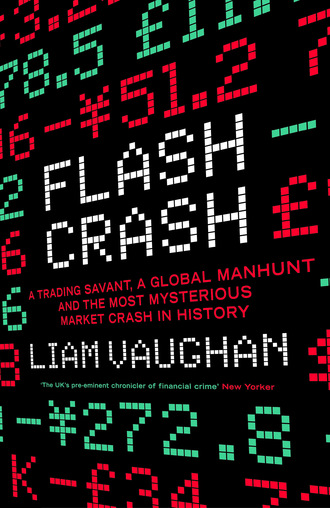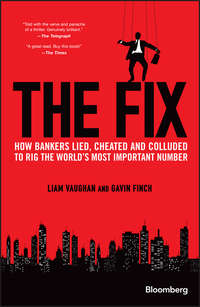
Flash Crash
CHAPTER 6

END OF AN ERA
On a spring afternoon in 2008, traders at Futex returned from lunch to find Nav leaning back in his chair with his hands behind his head. For hours he didn’t touch his computer. A rumour made its way around the office: ‘He’s on strike.’
After five years, Nav had fallen out of love with Futex. He was fed up with the schlep to Woking and the distractions that awaited him when he got there. He was tired of begging for bigger limits. But most of all, he was sick of giving his money away. When he joined the arcade, he’d signed a contract agreeing that, in exchange for Futex staking him, he’d give up a share of his profits, a monthly desk fee and a commission on every ‘round-trip’. The profit split started at 50/50 and went up on a sliding scale depending on how much he had in his trading account. Now that Nav had accumulated more than £1 million ($1.6 million) he was entitled to 90 per cent of everything he withdrew, the maximum available.
For fledgling traders, Futex was an attractive proposition. They were given capital to try their hand and didn’t pay anything back until they were profitable. If they failed, as most did, they could walk away owing nothing. The flip side was that those who did make it subsidised everyone else. By now, Nav was routinely earning $50,000 a day, which meant giving $5,000 to the Rossis. And, with his frenetic style of trading, he could easily hand them an additional $2,000 in commissions. ‘A lot of these people, it was their first job, just out of uni, twenty-two, twenty-three years old,’ says one former trainer at Futex. ‘They keep them very much within those four walls, and because they’re down in Woking they rarely speak to anyone else within the City. But then they speak to other prop houses and realise what a shitty deal they have.’
Nav’s 90/10 split was generous by the standards of most other traders on the floor, but he wanted 95 per cent. When the Rossis refused, he shut down his trading software knowing he’d be severely crimping the company’s cash flow. It was the culmination of a feud that had been escalating for a while. A couple of years earlier, Nav had decided to quit trading FTSE 100 futures, the UK equivalent of the S&P 500 e-mini, where he was regularly making £2,000 a day, to try his hand at some bigger markets. After a shaky start, Paolo took Nav aside one day and suggested he go back to the FTSE. ‘Five hundred grand a year, that’s more than enough for you,’ Rossi said.
‘How do you know what’s enough for me?’ Nav replied, incensed that Paolo of all people would try to clip his wings.
On another occasion, Nav had gone home one night after placing a two-hundred-lot trade. The next morning, he was woken up by a call from Paolo telling him he’d lost a million dollars, virtually everything he had, he would later recount to a friend. Nav was shocked. ‘Just get me out,’ he said.
‘Nav, calm down,’ Paolo chuckled, according to Nav’s recollection, ‘you’re a hundred and twenty ticks onside!’ Nav’s overnight trade had earned him hundreds of thousands of dollars. ‘This is a lesson for you: always have a stop in the market. One of these days something like this will happen and you’ll get rolled over.’
It was an incredible result, but Nav couldn’t get past Paolo’s attempt to scare him into exercising better risk management. When he arrived at the office, he remembers marching into the owner’s room and shouting: ‘Are you still gonna take my money after that little escapade? Putting me through that and then charging me two hundred thousand dollars for it?!’ Nav was on an 80/20 profit split at the time. ‘What a wanker,’ he complained to the friend. ‘The guy’s got no shame.’
It didn’t help that Paolo was so blatant about how much money he had. Futex’s website had a page titled ‘Futex Lifestyle’, which could more accurately be described as ‘Paolo Rossi Lifestyle’. There were photos of Rossi at the Wimbledon final and watching Champions League football. Once, when his Ferrari had come back from the garage and the Lamborghini he’d been given as a replacement hadn’t yet been taken away, he posted a picture of them both with the caption ‘some tough choices’. One of his cars had the licence plate R9ssi and he was a member of Queenwood, one of the UK’s most exclusive golf clubs, where he shared the fairways with Hugh Grant, Catherine Zeta-Jones and golf pro Ernie Els. ‘All that material stuff is pointless and attracts the wrong people,’ Nav said to his colleagues with disdain. ‘Trust me. It’s a mirage.’
But Paolo wasn’t the only one displaying his success. In August 2007, a magazine called Trader Monthly published its annual ‘30 Under 30’ list of the most successful young traders. It included the following entry:
Legend has it that just outside London in the small, affluent city of Woking resides a pure prop trader who works two hours a day, two days a week – and still makes twice as much as anyone else at his clearing firm. The legend, it turns out, is true – and that gifted trader has the 30 Under 30-appropriate surname Young. ‘He wears jeans, his lucky jersey and no shoes,’ says one colleague. ‘He even puts on trades and sleeps at his desk.’
[Bradley] Young, an Aussie who spends more time on vacation than he does trading, has been known to pull down $250,000 a week even after the bosses at Futex exact their tribute …
Says Young: ‘From the very first day I traded a futures contract, I’ve always believed that I was going to be one of the greatest traders of all time. As each day passes and my career progresses, this belief becomes stronger.’
Trader Monthly was launched in 2004 and quickly became popular on trading floors around the world, mixing profiles of Big Swinging Dicks with articles on classic cars and how best to disguise one’s strip club receipts when claiming expenses. Like its readership, it was male, crude and brash. But the ‘30 Under 30’ feature took off and was frequently picked up by the mainstream press. CNBC interviewed inductees like they were celebrities. For Brad to be anointed was major kudos, even if the stuff about him barely turning up to the office was untrue.
A couple of months later, Nav emailed the editor:
Good evening,
I have recently been introduced to your magazine and must congratulate you, since it is one of the better publications I have seen on the art of trading. I read with interest your top 30 under 30 list and was wondering what criterion someone would need in order to be part of it. I am a local who works on a 90/10 split. I trade the e-mini SP 500 and on volatile trading days I do on average 10,000 round turns or about 1% of the SP 500’s total daily volume. If I trade well on a volatile day I normally make circa $133,000. On quiter [sic] days I look to make between $45,000 and $70,000.
It’s been an extraordinary year in my trading career. You must understand that for me to be in the top 30 is not a vanity thing. I prefer to keep a low profile and indeed hide my P&L’s from my trading colleagues. However, I am looking to set up a trading arcade of my own and maybe the publicity would be a good thing for the arcade. Maybe we can do something in the future.
Best regards,
Navinder.
Nav never did feature in Trader Monthly, and he didn’t start his own arcade, but he was beginning to outstay his welcome at Futex. Once a major generator and a great advertisement for the firm, he was increasingly looking like a liability. He came to the office less and less frequently, and when he did turn up, he caused trouble. At one point, he complained that his bank was stealing money from his trading account. When the Rossis told him he was mistaken, he questioned whether they were in on it. Nav’s nosebleed stakes were giving management sleepless nights and, if he took home any more than 90 per cent of his profits, the economics no longer stacked up. Earlier in the year Nav had paid to ‘lease a seat’ at the CME – essentially, a form of membership with privileges – which slashed the fees he paid the exchange per trade, in turn eating into Futex’s commissions. The firm also suggested it had received warnings from Her Majesty’s Revenue & Customs that Nav wasn’t paying his taxes.
Matters came to a head in the summer of 2008 when Nav told Futex he was leaving and wanted his capital, a sum of around $3 million. At first Paolo resisted, telling Nav he’d return the money in installments until he was confident the tax authorities were happy. When Nav instructed a lawyer to begin legal proceedings, Paolo caved, but ties between the two men were severed for good.
‘At the best point our relationship would have been mentorstudent, at the worst point you’re dealing with a mentality that if you hold him back, he feels like you’re against him,’ says Rossi. ‘If you don’t give him the limits he wants, you’re against him, if you’re taking a clearing fee, you’re against him. He’s got this mentality that everyone is ripping him off. But we nurtured him and at Futex he knew everyone. It was like a brake on his worst instincts. When he left there was no one to look out for him.’
Конец ознакомительного фрагмента.
Текст предоставлен ООО «ЛитРес».
Прочитайте эту книгу целиком, купив полную легальную версию на ЛитРес.
Безопасно оплатить книгу можно банковской картой Visa, MasterCard, Maestro, со счета мобильного телефона, с платежного терминала, в салоне МТС или Связной, через PayPal, WebMoney, Яндекс.Деньги, QIWI Кошелек, бонусными картами или другим удобным Вам способом.


